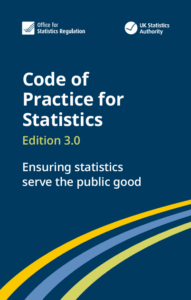 Official statistics serve the public good when, as public assets, they provide insight that allows them to be used widely for informing understanding and shaping action.
Official statistics serve the public good when, as public assets, they provide insight that allows them to be used widely for informing understanding and shaping action.
The Code of Practice for Statistics (the Code) sets the standards that those producing official statistics should apply to deliver statistics that serve the public good, in line with section 10 of the Statistics and Registration Service Act 2007.
But the Code is not just for official statistics. Everyone can apply or draw on the Code. It can help show what is needed to have confidence in data, analysis and statistics, whether as a user of information or as a producer of information.
The Code is based on the core principles of Trustworthiness, Quality and Value (TQV), which are introduced in the section Understanding TQV. TQV is a useful framework for analysts and organisations both inside and outside of government.
The Code Principles unpack TQV and help anyone using data and producing statistics to work in a way that allows others to have confidence in their commitment to delivering the best possible outputs.
The Standards for Official Statistics set out the specific standards and practices related to each Code principle that producers of official statistics must follow to ensure that official statistics serve the public good and support public confidence.
Closely related are the standards that help ensure public bodies use statistics, data and wider analysis transparently and with integrity, clarity and accuracy. The Standards for the Public Use of Statistics, Data and Wider Analysis describe the three standards and related practices that all public bodies should meet when communicating statistics, data and wider analysis in the public domain.
Guidance
A set of short guides is available to support the use of the Code Principles and the Standards for Official Statistics. These are helpful for any producer of statistics, providing a wide range of resources relevant to each area of practice.
Guidance: Ensuring Public Accountability outlines a model for public accountability that we expect official statistics producers to apply and encourage any producers that publish statistics to adopt, including those who voluntarily apply the Code.
Guidance on the Standards for the Public Use of Statistics, Data and Wider Analysis helps anyone working within public bodies to understand their role in ensuring statistics, data and wider analysis are communicated in an open way and to apply the standards in their work.
Required policies and statements relating to official statistics production provides a list of the organisational policy documents and statements, relating to official statistics production, required in the Code of Practice for Statistics edition 3.0.
TQV Voluntary Application Guidance: outlines how to show Trustworthiness, Quality and Value when working with data and statistics
Key definitions
Our Code of Practice Glossary gives key definitions of terminology used throughout the Code of Practice and its supporting guidance.
It is important to understand the difference between official statistics, accredited official statistics and official statistics in development when applying the Code of Practice.
The Office for Statistics Regulation and the Code
The Code is maintained by the Office for Statistics Regulation (OSR), the regulatory arm of the UK Statistics Authority. The Statistics Registration and Service Act 2007 requires the Authority to publish and maintain a code of practice.
The Code aligns with the Civil Service and NI Civil Service core values of integrity, honesty, objectivity and impartiality. It is consistent with the Nolan principles, the Ministerial Code and the Northern Ireland Guidance for Ministers, as well as the UN Fundamental Principles of Official Statistics.
OSR maintains policies related to the Code of Practice for Statistics that guide our regulatory work – for further information, see the OSR policy webpage.
